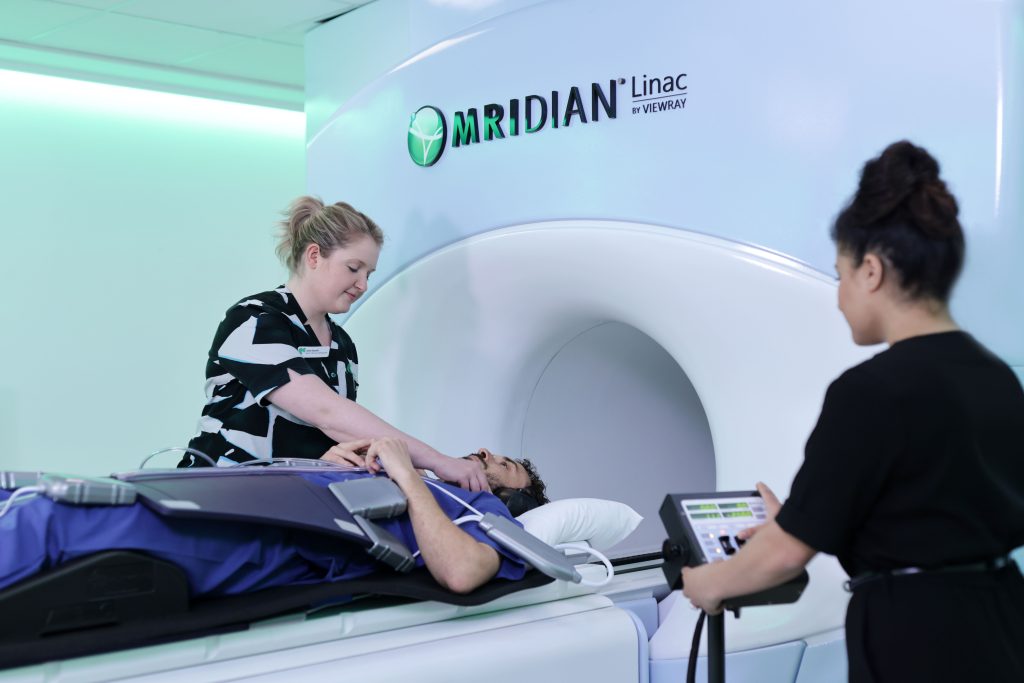Stereotactic Ablative Radiotherapy (SABR) – an alternative to surgery
SABR is an effective alternative to surgery in cancers such as prostate, pancreatic, renal and lung. In addition, the use of SABR can help patients to safely delay chemotherapy or provide tumour control instead of chemotherapy.
GenesisCare is an established provider of specialist SABR treatment with a network of 14 centres and also has the UK’s first MRIdian for MRI-guided SABR in our centre in Oxford. The MRIdian uses magnetic resonance imaging and automatic radiotherapy beam gating – allowing the beam to stop while the tumour is out of position – for real-time adaptive planning. This innovative SABR technique promises increased confidence that the target is hit every time with minimum damage to surrounding tissues.
SABR in prostate cancer
Radical external beam radiotherapy is one of the preferred treatment options for localised prostate cancer, particularly for intermediate-risk and high-risk disease.1 More recently there has been a move to hypofractionated radiotherapy – delivering higher doses in fewer fractions than conventional radiotherapy. This has been driven by an understanding of the radiobiology of prostate cancer and its relative sensitivity to dose per fraction and total overall dose compared to surrounding healthy tissue.
There is now a growing body of evidence in support of extreme hypofractionation – for prostate cancer this means five treatments. This is achieved using SABR also known as stereotactic body radiation therapy (SBRT), and is one of the most important advanced radiotherapy techniques currently available for the treatment of tumours in the prostate, and also the lung, pancreas and liver. It focuses beams of high-dose radiation at tumour sites with sub-millimetre accuracy – with the aim of achieving local control in just a few short treatments.
SABR in pancreatic cancer
With COVID-19 currently causing delays to surgery which can negatively impact on the outcome of treatment, patients with cancers arising in the pancreas can be offered SABR over five treatment visits as an alternative to major surgery. SABR to the pancreas is best carried out with good visualisation of the small bowel surrounding the pancreas to reduce the risks of damage. MR-guided radiotherapy with the MRIdian offers impressive soft tissue visualisation coupled with the ability to track target motion and therefore reduce dose to the surrounding bowel.
SABR in renal cancer
Renal cancers are traditionally treated with surgical removal or with thermal or radiofrequency ablation. However, SABR is increasingly considered as an option instead of these methods of treatment, especially where access to general anaesthetic is limited. Evidence supports the use of a large single dose of SABR to kidney cancers up to 6cm in diameter. The treatment is well tolerated even in patients with cancer in a solitary kidney as renal function remains virtually stable.
SABR in lung cancer
Lung cancer has a long history of successful therapy with SABR. Treatment is well tolerated and can be used also in cases where lung function might preclude surgical intervention.
Read more about SABR and MRIdian at GenesisCare
For enquiries about SABR or a review by our SABR MDT, email sabr@genesiscare.co.uk or call 0808 301 9774.
How to access
We are recognised by all the private health insurers for outpatients, diagnostics and cancer treatment. A GP referral letter is usually required in order for the patient to gain pre-authorisation from their insurer. For patients who wish to self-fund, prices are available from the centre.
GenesisCare
GenesisCare is the UK’s leading independent cancer treatment provider offering chemotherapy, radiotherapy and diagnostics. Our advanced and innovative treatments and techniques ensure we offer all our patients the best possible outcome.
All 14 of our specialist oncology outpatient centres can treat without delay and are able to accept new referrals for diagnostics, chemotherapy and radiotherapy. We are operating a safe environment, with modified practices to protect patients and staff and many of our centres operate as stand-alone clinics. Find out more
References



